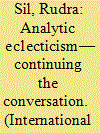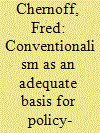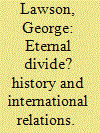| Srl | Item |
| 1 |
ID:
175158


|
|
|
|
|
| Summary/Abstract |
In this response to the contributions in this symposium, I approach the above articles not as wholesale critiques requiring point-by-point rebuttal but as constructive engagements that require clarification or invite further reflection as part of an ongoing conversation. In some instances, I revisit and elaborate upon the main motivations and assumptions that Peter Katzenstein and I had in mind as we sought to lay out the significance of analytic eclecticism for different audiences. At other times, I take it upon myself to consider aspects of our approach that might be updated or reframed in light of concerns raised by some of the authors. I specifically address four issues that have been raised: the core logic of analytic eclecticism and its operationalization with respect to once-dominant paradigms in International Relations; the link between complexity, causality, and constitutive logics; the status of metatheory and the links between eclecticism and pragmatism; and the relationship between scholarly debates and “real-world” issues of policy and ethics. Whether the response is satisfactory or not, it is worth bearing in mind that, for Peter Katzenstein and myself, analytic eclecticism was always meant to be more of an ethos than a method or manifesto; that ethos long predates our published work and is evident in the thoughtful contributions that constitute this symposium.
|
|
|
|
|
|
|
|
|
|
|
|
|
|
|
|
| 2 |
ID:
087495


|
|
|
|
|
| Publication |
2009.
|
| Summary/Abstract |
This article considers three factual observations about the history of the study of International Relations and examines how well several different metatheories of IR can account for them. The three facts are, first, that there has been persisting disagreement between supporters of contending theoretical approaches; second, that there have been occasional cases in which opposing scholars have converged on certain conclusions; and third, that the field of IR was intended by its founders to have some bearing on policy and some capacity to help change the world. The article contrasts several well-known philosophical principles on which metatheories have been based. The article concludes that all three challenges can be met by only one such metatheory, which I term `causal conventionalism', based in part on principles developed a century ago by Pierre Duhem.
|
|
|
|
|
|
|
|
|
|
|
|
|
|
|
|
| 3 |
ID:
113805


|
|
|
|
|
| Publication |
2012.
|
| Summary/Abstract |
On one level, history is used by all parts of the International Relations (IR) discipline. But lurking beneath the surface of IR's approach to history lies a well-entrenched binary. Whereas mainstream positions use history as a means to fill in their theoretical frames (seeing history as a kind of 'scripture' of abstract lessons), many post-positivists reduce history to a pick-and-mix of contingent hiccups (a 'butterfly' of what-ifs and maybes). Interestingly enough, this binary is one reproduced throughout the social sciences. As such, there is a bigger story to the apparently 'eternal divide' between history and social science than first meets the eye. This article uses the various ways in which history is used - and abused - in IR to probe more deeply into the relationship between history and social science as a whole. This exploration reveals four frameworks, two drawn from history (context and narrative) and two drawn from social science (eventfulness and ideal-typification) which illustrate the necessary co-implication of the two enterprises. The article employs these tools as a means of re-imagining the relationship between history and social science (including IR), conceiving this as a single intellectual journey in which both are permanently in view.
|
|
|
|
|
|
|
|
|
|
|
|
|
|
|
|